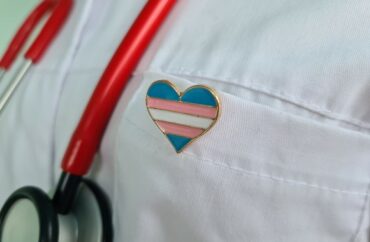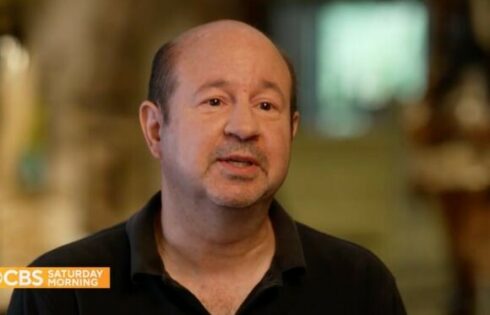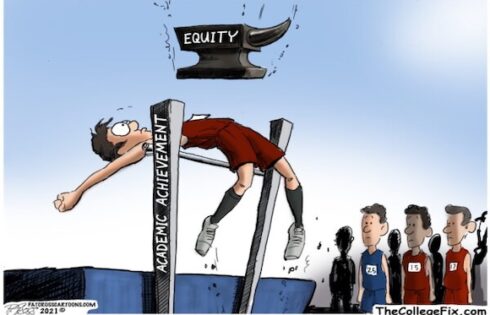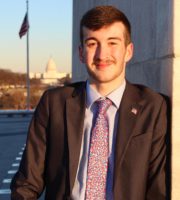
Students write songs, books in ‘call-to-action’ project for LGBTQ community
A Missouri lawmaker recently criticized a new LGBTQ nursing class at the University of Missouri at Saint Louis where students wrote songs and books to raise awareness about the “disparities and injustices facing the LGBTQ community.”
The course, “Healthcare Within the LGBTQIAA+ Community,” was offered for the first time in the fall 2023 semester through the nursing and honors colleges, but there are no plans to offer it again in the future.
Missouri State Rep. Chris Lonsdale, a Republican from Liberty, described the course as “a total disgrace to the healthcare industry and Missouri” in a statement to The College Fix late last month.
In the class, students learned about “health disparities and injustices facing the LGBTQ community, including implicit bias, the lack of rights for same-sex parents and state laws targeting the queer community,” according to UMSL Daily, the school’s online news outlet.
“Universities are worried more about pushing political propaganda than delivering real healthcare to Missourians. It’s a total disgrace to the healthcare industry and Missouri,” Lonsdale said.
When asked what universities should do to fix the issue, Lonsdale admitted there is “no easy fix,” because colleges are “getting crazier and crazier in terms of their politics.”
“Ending affirmative action and stopping the use of DEI statements on college employment applications would be a good start,” Lonsdale told The Fix. “Medical schools need to be focusing on the actual hard sciences and delivering real medical results not obsessed about social science and trying to socially train these doctors to be social justice activists.”
University spokesperson Steve Walentik told The Fix via email late last month that the class was a one-time offering and will not be held again. Walentik said they offer a new course each semester focused on “social and behavioral sciences.”
“Honors 2030 is a special topics course centered around inquiries in the social and behavioral sciences at the University of Missouri–St. Louis. Special topics courses are elective and often used to gauge student interest in a given topic,” Walentik said. “The fall 2023 course was focused on health care within the LGBTQ+ community.”
About one third of the students in the class were nursing majors, while the others came from music, social work, and other majors, UMSL Daily reported.
After a semester of lectures and discussions, students were tasked with forming groups and producing a “call-to-action” project “designed to increase access to health care for the LGBTQ community,” according to the report.
“One group comprised of a music major and nursing major composed, wrote and presented a song about microaggressions that people in the queer community are subjected to. Another group developed a flyer to increase awareness of the challenges faced by members of the queer community who are incarcerated. Yet another group wrote a children’s book designed to destigmatize LGBTQ parents and families,” UMSL Daily reported.
Assistant Teaching Professor Debra D’Arcy, who organized the new course, told the campus news that she was “learning horrible things that were impacting the queer community” and “wanted to make an impact on this specific problem.”
UMSL did not provide a copy of the course syllabus, as requested, saying the course advisor holds copyrights to it. But ten students took the course, according to information the university provided to The Fix.
When asked about the class, Dr. Stanley Goldfarb, board chair of the medical watchdog organization Do No Harm, told The Fix via email that it does serve a purpose because there are issues such as “sexually transmitted diseases that are more common in gay individuals and these need explanation.”
However, similar to Rep. Lonsdale’s take, Goldfarb raised concerns about the potential of personal views getting in the way of students’ education.
“There is nothing wrong with discussing the healthcare needs of LGBT individuals,” Goldfarb told The Fix. “If the course strays into justifying so-called gender affirming care, that is a problem, particularly in states where such care has now been banned.
“The question that arises regards the content of the material. If it approaches issues through the lens of critical race theory, blaming all healthcare problems on biases, when in fact, behavioral and other such problems are the real cause of any healthcare disparities, then the course is doing more harm than good,” Goldfarb said.
The Fix also reached out twice within the past three weeks to D’Arcy and students who took the course in search of the syllabus and further information, but did not receive any responses.
MORE: Med schools redo ‘diversity’ programs after federal complaints
IMAGE: Shutterstock
Like The College Fix on Facebook / Follow us on Twitter






Please join the conversation about our stories on Facebook, Twitter, Instagram, Reddit, MeWe, Rumble, Gab, Minds and Gettr.